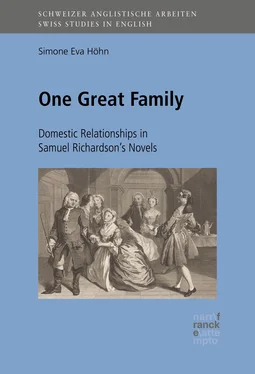At the same time, however, HaywoodHaywood, Eliza does not allow her reader to perceive Eudosia’s behaviour as a mere masquerade. Eudosia is a “Pattern of Prudence and Good-nature” (the latter point is proven when she begs her husband to provide for his mistress before sending her away). Her scheme, then, of conquering through a display of generosity, is natural to her. Moreover, she “still retained the most tender Affection for her Husband” (112) despite his cruelty. Her love further naturalises her patience, elevating it from a simple ploy to noble loyalty. This insistence on the wife’s love appears to be a universal element of the trope of the neglected wife. It appears, for example, in Sarah Fielding’s novel David Simple Fielding, Sarah, correspondent of Richardson. Early in the story, the eponymous hero boards with different people in order to “seek out one capable of being a real Friend” (27). The wife of one of his landlords proceeds to tell him the details of her married life and the abuse her husband heaps on her. Yet she concludes her story with the following words:
Thus even my Tenderness for him is turn’d against me, and I can do nothing that he does not dislike; yet my Fondness still continues for him, and there are no pains I would not take, if he would return it; but he imputes it to a Warmth in my Inclination, which Accident might as well have given to another Man. (56)
Like EudosiaHaywood, Eliza, this virtuous wife continues to feel affection for her tormentor. Yet although the narrative asks us to take her words at face value, tensions are perceptible between her laying open, however hesitantly, her husband’s faults, and her assertion that she still loves him. Perhaps more interesting, however, is the problem raised by the last part of the sentence quoted: what does the wife’s obligatory love stem from? If it is ‘natural’, might there be some justice in the husband’s assertion that she would have felt it for any other man? And if it is the effect of a conscious effort to control her emotions, can it still be ‘true’? These are the questions which torment Lovelace, and which he uses to justify his repeated ‘trials’ of Clarissa’s love and virtue.
Sarah FieldingFielding, Sarah, correspondent of Richardson’s narrative, in contrast, does not problematize this uncertainty. Her world, although recognizable for contemporary southern England – most of the novel is set in London, Bath and their surroundings –, is organized largely according to the logic of allegory. Duplicity and lies exist, of course, but they are inherently knowable. The same is true, I would argue, for her brother’s more complex novels. Henry Fielding plays with the concept of the ‘reporter-narrator’. He repeats, for example, “the Observation of some antient Sage, whose Name I have forgot”, or records details about his hero Joseph’s diet: “He accordingly eat either a Rabbit or a Fowl, I never could with any tolerable Certainty discover which” ( Joseph Andrews Fielding, Henry 29, 59). The narrator’s very uncertainty, however, testifies to the knowability of the world depicted. The “Sage’s” teachings could be looked up in another book, if the reader happened to have a better memory than the narrator, and the details of Joseph’s meal might be found out by a more diligent enquirer. Similarly, there is little inherent mystery about characters’ motivations. In many cases, a character’s main traits are given away by their very name, as in the case of Allworthy or Shamela. Such characters have been said to “belong to […] a moment […] that we might call allegorical , a moment, possibly fictitious, when social role and inner persona were indistinguishable” (RosenRosen, David and Aaron Santesso & Santesso 1046). In some cases, of course, Fielding chooses to obscure or hide a character’s motivations – as he does when withholding the knowledge that Bridget Allworthy is in fact Tom Jones’s mother –, but they are comprehensible when outlined by the narrator. Duplicity, hypocrisy and lack of frankness are thus contained within Fielding’s narrative; the narrator is able to state clearly their cause and limits.
The same is not true for Richardson’s novels. The cause is less that his protagonists have unconscious motivations while Fielding’s have not; rather, it is that there is no agent within the story that can safely set the limits of allowable equivocation and ‘prudent’ scheming. In epistolary fiction – if not “in all writing”, as William WarnerWarner, William Beatty has suggested – “there is nothing within a text to distinguish a true narrative from its false simulation” ( Licensing Entertainment 210). In a novel where each event and every thought are filtered through characters driven by half-conscious desires as well as conscious values, the establishment of an absolute ‘truth’ appears oxymoronic. I am not especially concerned with the ‘real reader’ here, who knows that s/he is safely outside the fiction and can choose, for example, to trust the ‘editor’-author’s preferences for certain characters, or to read the novel against the grain by assuming, say, that Pamela is really ShamelaFielding, Henry. Instead, I ask what happens to the fictional reader-characters when they acknowledge that ‘truth’ can look like a masquerade, and vice versa.
As Richardson’s characters recognise, events are shaped by their telling. Pamela’s ordeal at the hands of Mr. B. becomes a “pretty Novel” (232) with a power of its own – it is through reading her version of events that the would-be seducer decides to marry her. Even then, however, he fails to understand her whole mind – although he recognises her virtue, he is unable to ‘read’ her love (which Pamela, in turn, only recognises once he sends her away). It is, perhaps, no coincidence that the married Pamela finds the need to conceal her jealousy almost unbearable. Her pain, as well as the negative effect her behaviour has on Mr. B., proves that she is not and never has been a “finish’d hypocrite” ( Pamela in her Exalted Condition 402). In contrast, the kind of behaviour which EudosiaHaywood, Eliza assumes is presented as praiseworthy and wise in Grandison , where hypocrisy is a less pressing issue. Significantly, however, the woman who practises it – Lady Grandison, the hero’s mother – is dead by the time the narrative starts; her story is told only in retrospect, almost as an exemplum. Indeed, as Margaret DoodyDoody, Margaret Anne has observed, “as soon as [Richardson] examines a situation closely he begins to query abstract theoretical statement” ( A Natural Passion 96). Lady Grandison’s behaviour works because she is not really a ‘character’ at all.
Pamela , the novel which divided the world into “ Pamelists and Antipamelists ” (qtd. in KeymerKeymer, Tom, Richardson’s Clarissa 23), is an extreme case. As hinted above, hypocrisy is a less problematic issue in Grandison , which does not entail such a direct challenge to hierarchies of class and gender. Even where less is at stake, however, narration remains self-representation; the writer’s essence – her thoughts, words, and actions rendered in detail – inescapably is also ‘performance’. David RosenRosen, David and Aaron Santesso and Aaron Santesso quote the sociologist Erving Goffman to express the complex interplay of “observation, interiority and behavior”: “[As] performers, individuals are concerned not with the moral issue of realizing these standards [by which they are judged], but with the amoral issue of engineering a convincing impression that these standards are being realized” (1043; first square bracket in the original). The problem of Richardson the novelist – and of his characters – is that virtuous characters should be most concerned with realizing the standards, rather than with performance. However, when the pursuit of moral standards looks identical to the mere “engineering a convincing impression”, how can true virtue be expressed and recognized? Early in Grandison , Harriet’s uncle Selby comments on the heroine’s claim that she has always tried “‘to keep down any foolish pride’”: “Then you own that pride you have?—Another point gained! Conscience, honest conscience, will now-and-then make you women speak out. But now I think of it, here is vanity in the very humility” (1:28). As Mr. Selby makes clear, Harriet’s seeming attempt to control her emotions may be read equally as an expression of true humility or as uncommonly subtle boasting. Sincerity and masquerade, propriety and hypocrisy, threaten to collapse into each other.1
Читать дальше












